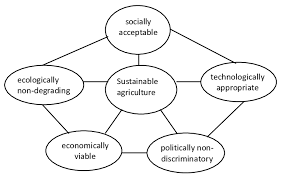Introduction
It is that form of farming which produces sufficient food and textiles to meet the needs of present generation without compromising the ecological balance and life supporting system of future generations. Sustainable agriculture consists of environment friendly methods of farming that allow the production of crops or livestock without damage to human or natural systems. It involves preventing adverse effects to soil, water, biodiversity, surrounding or downstream resources. In the US National Agricultural Research, Extension and Teaching Policy Act of 1977, the term “sustainable agriculture” is defined as an integrated system of plant and animal production practices having a site-specific application that will, over the long term:
- satisfy human food and fiber needs
- enhance environmental quality and the natural resource base upon which the agriculture economy depends
- make the most efficient use of nonrenewable resources and on-farm resources and integrate, where appropriate, natural biological cycles and controls
- sustain the economic viability of farm operations
- Enhance the quality of life for farmers and society as a whole.
Sometimes, it is also called ecological farming or organic farming, because ecological balance is given importance and organic matter is main source of nutrient management.
Why sustainable Agriculture?
Agriculture has an enormous environmental impact, causing climate change, water scarcity, land degradation, deforestation and others. It is simultaneously causing environmental changes and being impacted by these changes too. And therefore, the best ways to mitigate climate change is to create sustainable food systems (healthy food & without impact on ecosystem) based on sustainable agriculture, since it provides a potential solution to enable agricultural systems, to feed a growing population within the changing environmental conditions. The term sustainability means sustainable use of ecosystem that can be maintained indefinitely, without impairing its capacity for renewal.

How it can be maintain?
- Minimal tillage practices
- Ecological balance
- Nutrient management through use of organic matter
- Environmental education and awareness in the farming community about four key factors of farming- climate, soil, nutrients and water resources; and their sustainable use. It means resource utilization as per carrying capacity.
- Design with nature-means use of appropriate technology which is locally adaptable, eco-friendly, resource efficient and culturally suitable.
- Optimal use of resources, reuse and recycle approach
Read more..
SUBSISTENCE FARMING-HISTORY & TYPES
TYPES OF FARMING- SYSTEM OF FARMING
INTEGRATED FARMING SYSTEM
AGRICULTURE IN INDIA: Development & Present Scenario
CROP ROTATION- CHOICE & BENEFITS
CROPPING PATTERN-CROPPING SYSTEM
SOIL TYPES IN INDIA: FEATURES
SOIL PROFILE- DIFFERENT HORIZONS